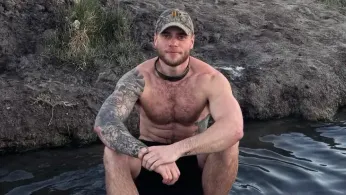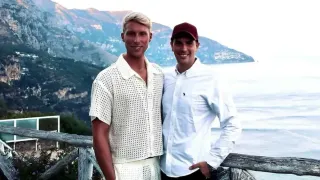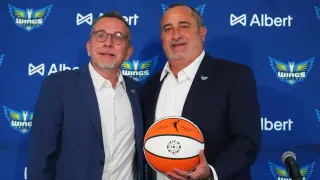
2 hours ago
Gus Kenworthy's Olympic Comeback: Style, Slopes, and the Joy of Coming Home to Yourself
READ TIME: 25 MIN.
Gus Kenworthy was done. Or so he thought.
After finishing eighth in the men's halfpipe final at the 2022 Beijing Winter Olympics, the 34-year-old freestyle skier made a quiet exit from competitive sport. It wasn't dramatic. It wasn't angry. It was simply the end of a chapter that had defined his life since he was three years old, when his parents first strapped skis to his feet. By 2022, Kenworthy had already achieved what most athletes only dream of: an Olympic medal, world championships, sponsorships, and a platform that extended far beyond the slopes. He had also become one of the most visible queer athletes in winter sports—a distinction he'd earned not through fanfare but through authenticity, visibility, and an unwillingness to hide who he was in a sport that, historically, hadn't always welcomed LGBTQ+ people with open arms.
But something unexpected happened during those three and a half years away. The love-hate relationship with skiing—the constant pressure, the grueling training cycles, the perfectionism that had driven him for decades—began to transform into something simpler: genuine joy.
"I was definitely not always going to come back, "Kenworthy said. "I was sure I was done. " Yet in May 2025, he posted a cheeky Instagram reel asking his 1. 2 million followers whether he should attempt a comeback. The decision had already been made, but the question itself felt like an invitation—a way of bringing his community along for the ride.
Now, as Milano Cortina 2026 approaches, Kenworthy is hoping to be part of Great Britain's snowsport squad, preparing for what could be his most meaningful Olympic appearance yet. And this time around, he's not just bringing his skills to the halfpipe. He's bringing his whole self—style, personality, and all.
If there's one thing Kenworthy has always understood, it's that being an athlete doesn't mean checking your personality at the door. Long before he became a vocal advocate for LGBTQ+ visibility in sports, he was known for his impeccable sense of style—a rarity in a sport where most athletes prioritize function over form. That distinctive blend of athletic excellence and fashion-forward thinking is now central to his Olympic experience in Milan.
Through Airbnb's exclusive Olympic experiences program, Kenworthy is hosting a unique shopping and styling session in Milan that goes far beyond typical celebrity meet-and-greets. Guests will explore the Milano Cortina 2026 Megastore alongside Kenworthy, discovering the new Olympic Games collection while receiving style tips from someone who has always understood that representation matters—not just in sports, but in how we present ourselves to the world. The experience continues with a stroll through Milan's city center, a city known for its fashion heritage and cosmopolitan energy.
For queer audiences, this detail resonates on multiple levels. Milan has long been a beacon for LGBTQ+ culture and acceptance in Europe, and the image of Kenworthy—a proudly out athlete—walking through the city center, discussing fashion and Olympic spirit, feels quietly revolutionary. It's a reminder that queer athletes don't have to compartmentalize their identities. They can be fierce competitors and style icons. They can be serious about their sport and playful about their presentation. They can take up space in all the ways that matter.
Beyond the shopping experience, Kenworthy is one of 26 athletes—active and retired Olympians and Paralympians from seven countries and 15 disciplines—hosting curated Airbnb experiences around the Milano Cortina Games. These aren't just photo opportunities. They're moments of genuine mentorship and connection.
Jamie Anderson, a three-time Olympic snowboarding medalist, will host guests at the halfpipe finals on February 12 and 13, 2026, sharing her perspective on balance, sport, and environmental sustainability. Nathan Chen will guide figure skating enthusiasts through the technical nuances of the sport. And athletes like para ice hockey player Andrea Macrì and para biathlete Dani Aravich will share their experiences as Paralympic champions.
What makes Kenworthy's particular role significant is the implicit message: queer athletes belong at the center of Olympic storytelling, not at the margins. He's not being tokenized or asked to perform his queerness. He's simply being invited to share his expertise, his style, and his passion—the same way any other Olympic legend would be. That normalization is its own form of progress.
Kenworthy's return to competitive skiing isn't just a sports story. It's a meditation on burnout, self-discovery, and the courage to change your mind.
"I was definitely not always going to come back. I was sure I was done. It's interesting because I love skiing but it's admittedly a love-hate relationship, "he reflected. During his time away, he rediscovered why he fell in love with skiing in the first place—not because of medals or expectations, but because of the pure, visceral thrill of it. "Now I've taken a break, I've found a love for it again in a way that feels more like it did at the very beginning. That's the feeling of excitement. I used to be so in it, I lost sight and perspective. "
This narrative will resonate deeply with queer readers who have experienced their own cycles of burnout and rediscovery—whether in careers, relationships, or personal identity. The idea that stepping away doesn't mean failure, that rest can be radical, and that you can return to something you love on your own terms is profoundly queer in its ethos.
Kenworthy has also spoken about his admiration for Tom Daley, the British Olympic diver who similarly stepped away from competition before returning to win medals at Paris 2024. Both athletes share something beyond their athletic achievements: they're openly gay men who have navigated the pressures of elite sport while refusing to hide or diminish their identities. "He also came out as gay at a time that I was still struggling with my sexuality and I wanted to come out, "Kenworthy said of Daley. "There were a lot of parallels and so I looked up to him. "
As Kenworthy explores Milano Cortina 2026, the stakes feel different than they did at Sochi 2014 , or even at Beijing 2022 . This comeback isn't about proving anything to the world. It's about proving something to himself—that passion can be rekindled, that vulnerability is strength, and that being authentically yourself is compatible with elite athletic achievement.
"I want to hopefully go to another Olympics. I just need to take it day by day and get a run together that I'll be proud to do at Milano Cortina, "he said. There's a humility in that statement, a recognition that the outcome matters less than the journey. For a queer athlete who spent years navigating a sport that wasn't always built for people like him, that shift in perspective feels like its own kind of victory.
Kenworthy's comeback arrives at a moment when LGBTQ+ visibility in winter sports has grown, but queer athletes still represent a small fraction of competitors at the Olympic level. His return—and his willingness to be visible, stylish, and unapologetically himself while doing it—sends a message: queer athletes don't have to choose between authenticity and excellence. They can have both.
The image of Kenworthy shopping in Milan, discussing fashion and Olympic spirit, feels like a small but significant act of reclamation. For decades, Olympic athletes have been expected to be one-dimensional: focused, driven, singular in their purpose. But Kenworthy has always understood that the best athletes are whole people—people with style, humor, vulnerability, and complexity. His comeback, and his willingness to share that wholeness with fans through experiences like the Airbnb events, is a quiet revolution in how we think about Olympic athletes and queer representation in sports.
As Milano Cortina 2026 approaches, hopefully Kenworthy will take to the halfpipe alongside some of the world's best skiers. But he'll also be walking through Milan's streets, sharing style tips, mentoring the next generation of athletes, and embodying a version of Olympic excellence that feels radically, beautifully queer. That's worth celebrating—whether or not he brings home another medal.






